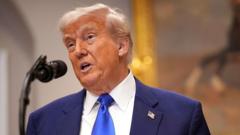The European Union's trade chief has asserted the bloc's commitment to maintaining constructive trade relations with the United States, amidst tensions sparked by President Trump's proposal of hefty tariffs on EU goods.
EU Trade Chief Advocates Cooperation Amid Trump’s Tariff Threats

EU Trade Chief Advocates Cooperation Amid Trump’s Tariff Threats
European officials emphasize dialogue and cooperation as US President Trump threatens steep tariffs.
EU Trade Commissioner Maros Sefcovic stated that the EU is dedicated to negotiations founded on "respect" rather than confrontation, following Trump's comments about imposing a 50% tariff on all EU imports. Sefcovic's remarks came after discussions with US trade representatives, underlining a unified European stance against the escalation of trade disputes.
Trump's threats emerged as frustration grew regarding the slow pace of EU-US trade negotiations. In his social media statements, he indicated that he was not seeking a deal but had pre-established terms, insisting that talks with Europe were stagnant. He highlighted that unless there were significant investments from European firms in the US, he would enforce the proposed tariffs starting June 1.
In reaction, leaders from across the EU voiced their concerns about the fallout of such tariffs on both economies. Irish Prime Minister Micheál Martin emphasized the need for ongoing negotiations rather than hostile measures. Trade Minister from France, Laurent Saint-Martin, echoed similar sentiments, affirming a preference for de-escalation and dialogue.
The EU, which trades extensively with the US, sending over $600 billion worth of goods annually, is striving to negotiate as a unified bloc amid fears of rising tariffs that could impact markets globally. Trump has previously criticized the EU for enjoying a trade surplus with the US, citing unfairness to American businesses, particularly in relation to automobiles and agriculture.
The potential trade conflict has caused noticeable fluctuations in stock markets, with declines observed in both US and European shares following Trump's latest tariff threats, signaling the broader economic implications of such trade disputes.
Trump's threats emerged as frustration grew regarding the slow pace of EU-US trade negotiations. In his social media statements, he indicated that he was not seeking a deal but had pre-established terms, insisting that talks with Europe were stagnant. He highlighted that unless there were significant investments from European firms in the US, he would enforce the proposed tariffs starting June 1.
In reaction, leaders from across the EU voiced their concerns about the fallout of such tariffs on both economies. Irish Prime Minister Micheál Martin emphasized the need for ongoing negotiations rather than hostile measures. Trade Minister from France, Laurent Saint-Martin, echoed similar sentiments, affirming a preference for de-escalation and dialogue.
The EU, which trades extensively with the US, sending over $600 billion worth of goods annually, is striving to negotiate as a unified bloc amid fears of rising tariffs that could impact markets globally. Trump has previously criticized the EU for enjoying a trade surplus with the US, citing unfairness to American businesses, particularly in relation to automobiles and agriculture.
The potential trade conflict has caused noticeable fluctuations in stock markets, with declines observed in both US and European shares following Trump's latest tariff threats, signaling the broader economic implications of such trade disputes.


















